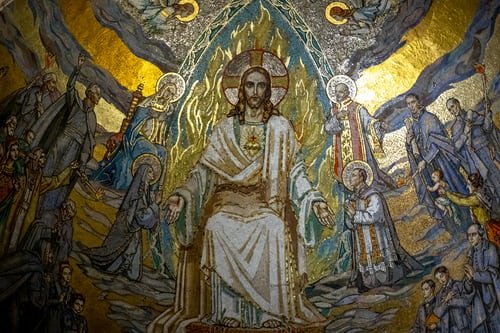Lent is a period of spiritual preparation for Easter that is observed by many Christians around the world. During this time, Christians often engage in fasting, prayer, and self-reflection as a way to prepare themselves for the celebration of Christ’s resurrection. However, there has been some debate among Christians about whether or not Lent is truly a Christian practice.


Some Christians argue that Lent is not a Christian practice because it is not explicitly mentioned in the Bible. They point out that the word “Lent” does not appear anywhere in the Bible, and that there is no specific commandment to observe a period of fasting and reflection leading up to Easter. However, other Christians argue that Lent is a Christian practice because it has been a part of Christian tradition for centuries.
Key Takeaways
- Lent is a period of spiritual preparation for Easter that is observed by many Christians around the world.
- Some Christians argue that Lent is not a Christian practice because it is not explicitly mentioned in the Bible.
- Other Christians argue that Lent is a Christian practice because it has been a part of Christian tradition for centuries.
Origins and History of Lent
https://www.youtube.com/watch?v=z2SuzVr5bdg&embed=true

Lent is a season of the Christian liturgical calendar that begins on Ash Wednesday and lasts for 40 days, culminating in Easter Sunday. Lent is a time of penance, fasting, and prayer, during which Christians prepare themselves for the celebration of the resurrection of Jesus Christ.
Biblical Foundations
The origins of Lent can be traced back to the Old Testament, where Moses and Elijah both fasted for 40 days. In the New Testament, Jesus himself fasted for 40 days in the desert before beginning his public ministry. This period of fasting and preparation has been imitated by Christians ever since.
Development in the Early Church
The history of Lent can be traced back to the early Church, where it was a time of preparation for those who were to be baptized at Easter. It was also a time of penance for those who had committed sins and were seeking forgiveness. During this time, Christians would fast, abstain from meat, and perform acts of charity and penance.
Over time, the practice of Lent evolved and became more structured. In the 4th century, Lent was extended to 40 days, in imitation of Jesus’ fast in the desert. During this time, Christians would fast every day except Sundays, which were considered feast days.
In the Middle Ages, Lent became a time of great spiritual renewal, with Christians engaging in acts of penance and devotion. This was also a time of great fasting, with Christians abstaining from all animal products, including meat, eggs, and dairy.
Today, Lent is still observed in many Christian denominations, including the Catholic, Orthodox, and Anglican Churches. While the practices and traditions of Lent may vary, the season remains a time of spiritual reflection, repentance, and preparation for the celebration of Easter.
The Spiritual Significance of Lent
https://www.youtube.com/watch?v=MKjrmj_STBU&embed=true
Lent is a time of spiritual preparation and reflection for Christians around the world. It is a season of 40 days that begins on Ash Wednesday and ends on Easter Sunday. During this time, Christians observe a period of fasting, repentance, moderation, self-denial, and spiritual discipline.
Time of Repentance
Lent is a time of repentance, where Christians reflect on their sins and seek forgiveness from God. It is a time to turn away from sinful behavior and turn towards God. Christians are encouraged to confess their sins and seek forgiveness from God, as well as from others that they have wronged. Lent is a reminder that Christians are not perfect, but that God is merciful and forgiving.
Journey of Faith
Lent is also a journey of faith. It is a time for Christians to deepen their relationship with God through prayer, fasting, and spiritual discipline. Christians are encouraged to read the Bible more often and to pray more frequently. Lent is a time to grow closer to God and to become more like Jesus Christ.

During Lent, Christians are reminded of the ultimate sacrifice that Jesus Christ made for them. Jesus Christ died on the cross for the sins of all humanity, and Lent is a time to reflect on this sacrifice. Christians are encouraged to make sacrifices of their own during Lent, as a way of showing their gratitude for the sacrifice that Jesus Christ made for them.
In conclusion, Lent is a time of spiritual preparation, reflection, and growth for Christians around the world. It is a time to turn away from sinful behavior and turn towards God. Lent is a reminder of the ultimate sacrifice that Jesus Christ made for all humanity, and a time to deepen one’s relationship with God.
Lenten Practices and Traditions
https://www.youtube.com/watch?v=lJDDXbvRFR0&embed=true
Lent is a significant period in the Christian calendar that starts on Ash Wednesday and ends on Holy Thursday, forty days before Easter. During this time, Christians observe a period of spiritual preparation, self-discipline, and reflection. Lenten practices and traditions are an essential part of this period, and they include fasting, abstinence, almsgiving, charity, prayer, and confession.
Fasting and Abstinence
Fasting and abstinence are two of the most common Lenten practices. Fasting involves reducing or eliminating food intake for a specific period, while abstinence involves giving up certain types of food or activities. On Ash Wednesday and Good Friday, Catholics aged 18 to 59 are required to fast by consuming only one full meal and two smaller meals that do not equal the full meal. Abstinence from meat is also required on Ash Wednesday and all Fridays during Lent.
Almsgiving and Charity
Almsgiving and charity are essential Lenten practices that involve giving to the poor, the sick, and the needy. Christians are encouraged to give generously to charities and organizations that help those in need. This practice is a way of expressing gratitude for the blessings received and sharing them with others.
Prayer and Confession
« Is Lord of the Rings a Christian Story?
Is Liberty a Christian School? Exploring the School’s Religious Affiliation »
Prayer and confession are also essential Lenten practices. Christians are encouraged to spend more time in prayer, attending church services, and reading the Bible. Confession is another key practice during Lent, where Christians confess their sins and seek forgiveness. It is a way of renewing one’s faith and starting anew.
Overall, Lenten practices and traditions are an essential part of the Christian faith. They provide an opportunity for spiritual growth, self-reflection, and renewal. By observing these practices, Christians can deepen their relationship with God and strengthen their faith.
The Liturgical Calendar During Lent
https://www.youtube.com/watch?v=77Fgyhcglv0&embed=true
Lent is a significant period in the Christian liturgical calendar that begins on Ash Wednesday and lasts for 40 days, excluding Sundays. During this time, Christians worldwide engage in prayer, fasting, and almsgiving, preparing for the celebration of Easter Sunday.
Ash Wednesday

Ash Wednesday marks the beginning of Lent, and it is observed by many Christians worldwide. On this day, Christians receive ashes on their forehead in the shape of a cross, symbolizing their mortality and repentance. Many Christians fast and abstain from meat on this day.
Holy Week
The week leading up to Easter Sunday is known as Holy Week. It begins with Palm Sunday, commemorating Jesus’ triumphant entry into Jerusalem, and ends with Holy Saturday, the day before Easter Sunday. During Holy Week, Christians remember Jesus’ passion, death, and resurrection.
Easter Sunday
Easter Sunday is the culmination of Lent and the most significant day in the Christian calendar. It celebrates Jesus’ resurrection from the dead, and it is a day of joy and hope. Many Christians attend church services, exchange Easter greetings, and enjoy festive meals with family and friends.
In conclusion, the liturgical calendar during Lent is a time of reflection, sacrifice, and preparation for the celebration of Easter Sunday. It includes significant events such as Ash Wednesday, Holy Week, and Easter Sunday, each with its own traditions and customs. Christians worldwide observe Lent in different ways, but the underlying message is the same: to remember Jesus’ sacrifice and to renew their faith in God.
Lent Across Different Christian Denominations
https://www.youtube.com/watch?v=UioPqhtBKyo&embed=true

Lent is a sacred period of fasting and prayer observed by many Christian denominations in preparation for Easter. While the observance of Lent is not mandated in the Bible, it has been a longstanding tradition in many Christian communities. Lent is observed differently by various denominations, with some practices being unique to certain groups.
Roman Catholic Observances
The Roman Catholic Church observes Lent as a period of penance, fasting, and almsgiving. During Lent, Catholics are encouraged to abstain from meat on Ash Wednesday and all Fridays during Lent. They are also expected to fast on Ash Wednesday and Good Friday, consuming only one full meal and two smaller meals that do not equal the full meal in quantity. Catholics are also encouraged to give alms to the poor during Lent.
Protestant Practices
Protestant churches have varying practices when it comes to observing Lent. Some Protestant denominations, such as Anglicans, Lutherans, and Methodists, observe Lent in a similar manner to Roman Catholics, with fasting, prayer, and almsgiving. Other Protestant denominations, such as Baptists and Pentecostals, do not observe Lent in the traditional sense but may incorporate elements of Lenten observance, such as fasting or prayer, into their worship services.
Eastern Orthodox Customs
The Eastern Orthodox Church observes Lent as a period of strict fasting and prayer. Known as Great Lent, this observance lasts for 40 days and includes abstaining from meat, dairy, and eggs. The Orthodox Church also has additional periods of fasting and prayer throughout the year, including the Nativity Fast and the Apostles’ Fast.
In conclusion, Lent is observed differently across various Christian denominations, with some practices being unique to certain groups. While the specific practices may differ, the underlying purpose of Lent remains the same: to prepare oneself for the celebration of Easter through prayer, fasting, and almsgiving.
Lenten Dietary Restrictions

During the Christian season of Lent, which lasts for 40 days leading up to Easter Sunday, there are certain dietary restrictions that believers follow. These restrictions are meant to symbolize sacrifice and penance, and they vary depending on the denomination of Christianity.
Meat and Dairy
Catholics, for example, are required to abstain from meat on Ash Wednesday and all Fridays during Lent. This means no beef, pork, chicken, or any other type of meat. However, fish is allowed, as are eggs and dairy products. This is because fish is not considered meat in the Catholic tradition, and eggs and dairy are not considered to be products of a living animal.
Fish and Eggs
Other Christian denominations may have slightly different rules regarding Lenten dietary restrictions. For example, some Orthodox Christians abstain from all animal products, including fish, during Lent. However, they may still eat shellfish, such as shrimp and crab, which are not considered to be fish.
Overall, the purpose of Lenten dietary restrictions is to encourage believers to reflect on their faith and make sacrifices in order to grow closer to God. While the specific rules may vary depending on the denomination, the underlying message of self-denial and spiritual growth remains the same.
Cultural Aspects of Lent

https://www.youtube.com/watch?v=TfSMcgvZfs8&embed=true
Lent is a time of spiritual reflection and preparation for Christians leading up to Easter. While it is primarily a religious observance, it also has cultural aspects that have developed over time. In this section, we will explore some of the cultural traditions associated with Lent.
Shrove Tuesday and Pancakes
Shrove Tuesday, also known as Fat Tuesday or Mardi Gras, is the day before the start of Lent. It is a day of feasting and celebration before the period of fasting and abstinence that characterizes Lent. In many cultures, pancakes are a traditional food for Shrove Tuesday. The reason for this is that pancakes were a way to use up rich ingredients like eggs, sugar, and milk before the fasting period began.
In the United Kingdom, Ireland, and other countries, Shrove Tuesday is also known as Pancake Day. It is a popular tradition to make and eat pancakes on this day. Pancake races are also a fun and quirky tradition in some places, where people race while flipping pancakes in a frying pan.
Lenten Music and Art
Music and art have played an important role in the cultural aspects of Lent. Many pieces of classical music have been composed specifically for the Lenten season, such as Johann Sebastian Bach’s St. Matthew Passion. These works often reflect the somber and introspective nature of the season.

In addition to music, there is also a rich tradition of Lenten art. Many famous works of art depict scenes from the Passion of Christ, such as Leonardo da Vinci’s The Last Supper and Michelangelo’s Pieta. These works serve as a reminder of the sacrifice that Christ made for humanity and the importance of reflection and repentance during Lent.
Overall, while Lent is primarily a religious observance, it also has cultural aspects that have developed over time. Shrove Tuesday and Pancake Day are fun and tasty traditions that have become associated with the season, while Lenten music and art serve as a reminder of the solemnity and significance of the period.
Modern Observances and Adaptations
As society has evolved, so has the practice of Lent. While the religious significance of the season remains the same, modern observances and adaptations have emerged.
Secular Participation
In recent years, Lent has become a more secular event, with people from all walks of life participating in the season of self-reflection and sacrifice. Many non-religious individuals choose to give up something they enjoy, such as sweets or social media, as a way to challenge themselves and practice self-discipline.
Digital Fasting

With the rise of technology, digital fasting has become a popular adaptation of Lent. This involves giving up technology or social media for the duration of the season, in order to disconnect from the constant stimulation of the digital world and focus on personal growth.
Some churches have even incorporated digital fasting into their Lenten practices, encouraging their congregations to take a break from technology in order to better connect with their faith and community.
Overall, while Lent remains a primarily religious observance, modern adaptations and secular participation have made the season more accessible to a wider range of individuals.
Personal Reflection and Growth
Lent is a time of personal reflection and growth for Christians. During this period, Christians focus on self-denial, spiritual discipline, and renewal in preparation for Easter. This time is an opportunity for believers to examine their lives, reflect on their faith, and grow in their relationship with God.
Self-Denial and Discipline

Self-denial is an important aspect of Lent. Christians are encouraged to give up something they enjoy or find comfort in as a form of sacrifice and discipline. This can be anything from food to social media to television. The purpose of self-denial is to help Christians focus on their faith and draw closer to God. By giving up something they enjoy, Christians are reminded of the sacrifice that Jesus made for them.
Spiritual Renewal
Lent is also a time for spiritual renewal. Christians are encouraged to spend more time in prayer and meditation, attend church services, and participate in acts of service and charity. This helps believers to grow in their faith and deepen their relationship with God. By focusing on spiritual renewal during Lent, Christians are better equipped to serve others and share God’s love with those around them.
In summary, Lent is a time for personal reflection and growth for Christians. By focusing on self-denial and spiritual discipline, believers can draw closer to God and deepen their relationship with Him. Through acts of service and charity, Christians can share God’s love with others and make a positive impact on the world around them.
Lent and Community Engagement
https://www.youtube.com/watch?v=rV8XpwPoRvI&embed=true
Lent is not just a time for personal reflection and spiritual growth, but also a time for community engagement. During this period, Christians are encouraged to extend themselves outward into their neighborhoods and engage with the community around them in a way that builds meaningful relationships.
Local Church Activities

One way to engage with the community during Lent is through local church activities. Many churches organize events and programs that bring people together and foster a sense of community. These activities can include Lenten Bible studies, prayer groups, and worship services that are open to the public.
In addition to these spiritual activities, churches may also organize social events that allow members of the community to come together and get to know one another. This can include potluck dinners, game nights, and other fun activities that promote fellowship and camaraderie.
Community Service
Another way to engage with the community during Lent is through community service. Christians are encouraged to give alms and show love and charity to those in need. This can take many forms, including volunteering at a local soup kitchen, donating to a food bank, or participating in a community cleanup project.
Community service not only benefits those in need, but also helps Christians to live out their faith in a tangible way. By serving others, they demonstrate the love and compassion that Jesus taught and modeled.
In conclusion, Lent is a time for personal reflection and spiritual growth, but it is also a time for community engagement. Through local church activities and community service, Christians can build meaningful relationships with those around them and demonstrate the love and charity that are at the heart of their faith.
Preparing for Easter and Beyond
https://www.youtube.com/watch?v=rAQQMmWjhF4&embed=true
The season of Lent is observed by many Christians around the world as a time of spiritual preparation for Easter. It is a time to reflect on one’s faith and make a renewed commitment to God. Lent begins on Ash Wednesday and lasts for 40 days, culminating in Holy Week, which is the week leading up to Easter Sunday.
Holy Week Reflections
During Holy Week, Christians reflect on the events leading up to Jesus’ crucifixion and resurrection. Many churches hold special services during this time, including Palm Sunday, Maundy Thursday, and Good Friday. These services provide an opportunity for Christians to remember the sacrifice that Jesus made for them and to renew their commitment to follow him.
One way to reflect during Holy Week is to read the Gospels and meditate on the events leading up to Jesus’ crucifixion and resurrection. This can be done individually or as a group. Some churches also hold special prayer services during this time.
Life After Lent
After Lent is over and Easter has passed, Christians can continue to live out their faith in their daily lives. One way to do this is to make a commitment to serve others. This can be done through volunteering at a local charity or church, or by simply reaching out to someone in need.
Another way to continue living out one’s faith is to stay connected to a community of believers. This can be done through attending church regularly, participating in small group Bible studies, or simply spending time with other Christians.
Overall, Lent is a time for Christians to reflect on their faith and make a renewed commitment to God. By taking the time to reflect during Holy Week and continuing to live out their faith after Lent is over, Christians can grow closer to God and make a positive impact in the world around them.
Frequently Asked Questions
What are the typical observances during the Catholic Lenten period?
During the Catholic Lenten period, the faithful participate in prayer, fasting, and almsgiving. They may also attend daily Mass, receive the sacrament of reconciliation, and engage in other spiritual practices to deepen their faith and prepare for Easter.
What are the fasting rules for the 40 days of Lent?
Catholics between the ages of 18 and 59 are required to fast on Ash Wednesday and Good Friday. Fasting means consuming only one full meal and two smaller meals that together do not equal the full meal. Catholics who are 14 years and older are required to abstain from meat on Ash Wednesday and all Fridays during Lent.
What is the duration of Lent in the Christian calendar?
The duration of Lent varies slightly among Christian denominations. In the Catholic Church, Lent begins on Ash Wednesday and ends on Holy Thursday, which is the day before Good Friday. In the Eastern Orthodox Church, Lent begins on Clean Monday and ends on the Friday before Palm Sunday.
Can you explain Lent to someone who is not Catholic?
Lent is a period of preparation and reflection for Christians leading up to Easter. It is a time to deepen one’s faith through prayer, fasting, and almsgiving. While Lent is most commonly associated with the Catholic Church, many other Christian denominations also observe the Lenten period in their own way.
Is the practice of Lent supported by biblical scripture?
The practice of Lent is not explicitly mentioned in the Bible, but the concept of fasting and repentance is. In the Gospel of Matthew, Jesus fasts for 40 days and nights in the wilderness before beginning his public ministry. The practice of Lent is therefore rooted in biblical tradition.
Why might some Christian denominations, like Baptists, choose not to celebrate Lent?
Some Christian denominations, like Baptists, do not celebrate Lent because they believe that spiritual practices should be a personal choice rather than a requirement of the church. They may also view Lent as a primarily Catholic tradition and therefore not relevant to their own faith practice.




















